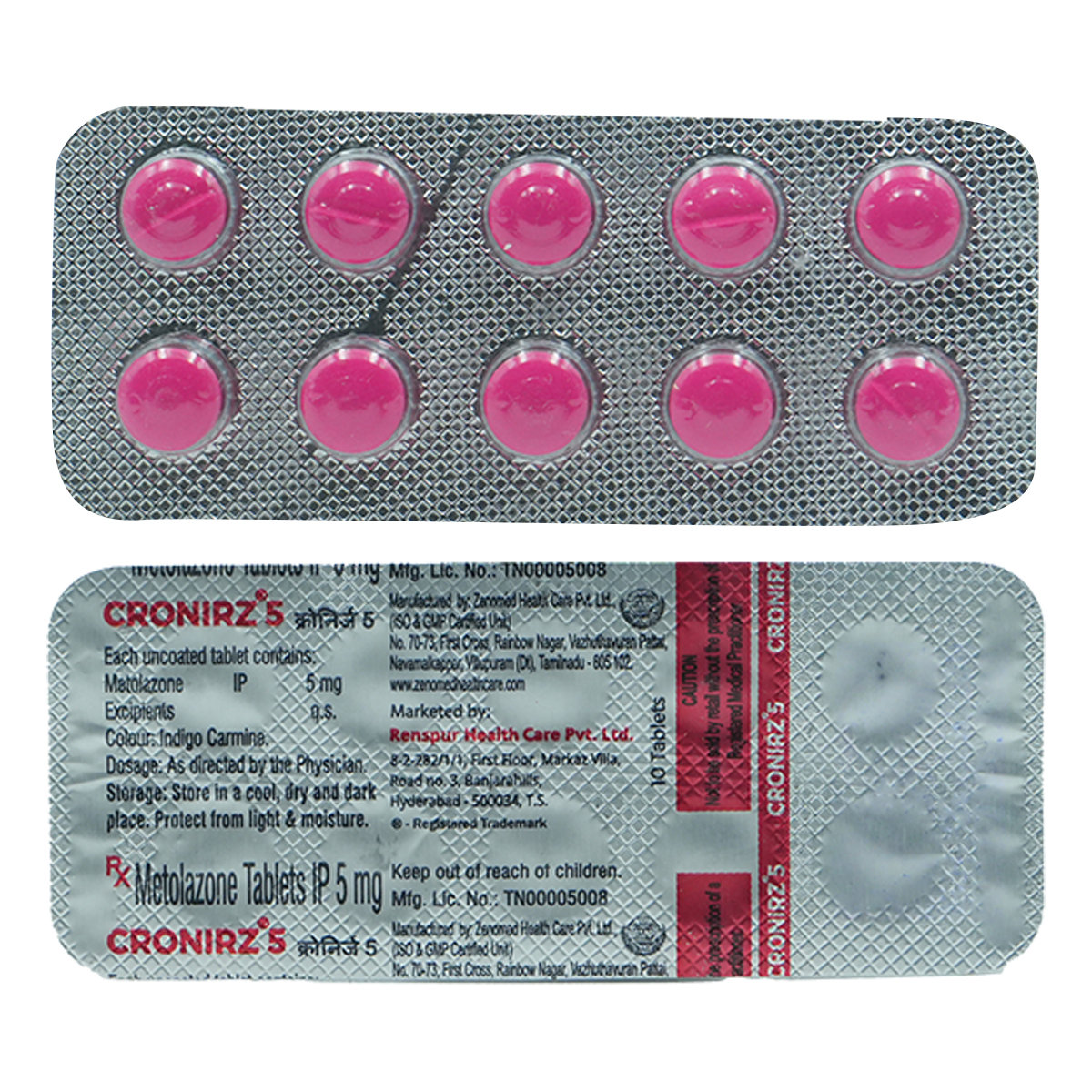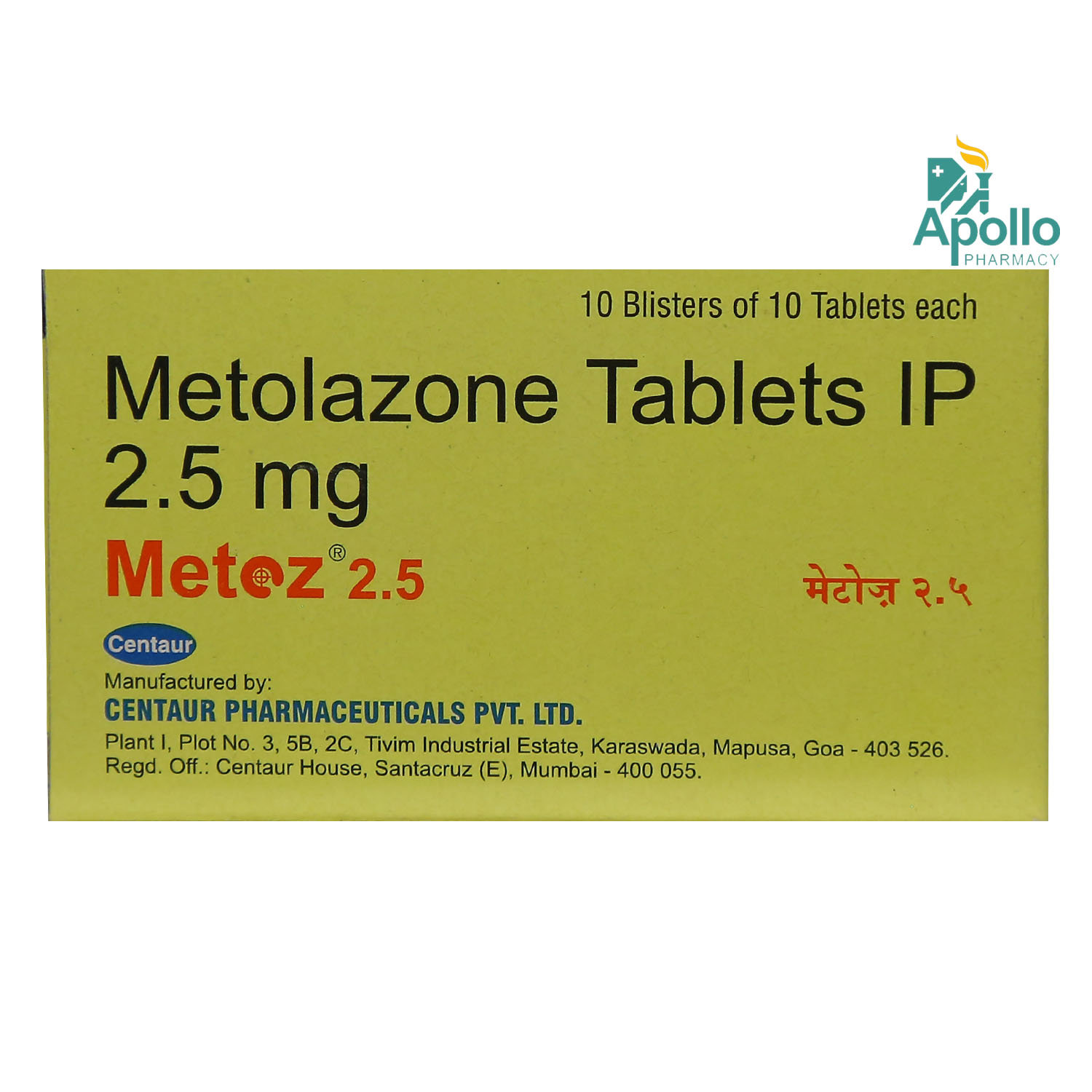Metolazone
About Metolazone
Metolazone is an antihypertensive drug that is used for the treatment of hypertension. Metolazone comes under the category of thiazide diuretic that prevents the body from absorbing an excessive amount of salt that may cause fluid retention. High blood pressure is known as hypertension. This is a medical condition in which the blood exerts high blood pressure against the walls of the blood vessel. Due to this, the heart has to work harder to pump the blood supply into the whole body. Hypertension can put a person on severe health complications, including stroke, heart failure, heart attack, and aneurysm.
Blood pressure is defined by the amount of blood pumped by the heart and the amount of resistance exerted by the arteries against the blood flow. During hypertension, arteries become narrower, and the heart starts pumping more blood resulting in high blood pressure. Uncontrolled blood pressure can put a person at risk of serious diseases.
The mechanism of Metolazone inhibits sodium's reabsorption in the body, resulting in an increase in chloride, sodium, and water excretion through urine. The shift in electrolytes and sodium levels reduces vascular resistance and makes the heart work normally. The production of diuresis and removal of excessive salt and fluid helps to lower blood pressure.
Metolazone is an oral medication that means to be taken by mouth. Follow the doctor's instructions carefully, and take Metolazone in the same way as directed by the doctor. Do not increase or reduce the dose; tell them about all the medicines and health problems. Do not change the dosage, stop, or start the Metolazone without checking with the doctor. Metolazone can make a person feel dizzy, so one should avoid doing activities like driving that need mental alertness. Along with the desired effects, Metolazone may cause some side effects, including headache, vomiting, itching, etc. Some of the side effects of Metolazone do not require medical attention and will pass with time. However, if a person is facing serious side effects or the side effects do not go away in a couple of days, then they must consult with their doctor about it.
Uses of Metolazone
Medicinal Benefits
Metolazone is prescribed for treating high blood pressure. Being a diuretic medication, Metolazone enhances the excretion of sodium and water through urine by restricting sodium absorption in the nephron tubes. If high blood pressure is not controlled for a longer time, then arteries and the heart will not be able to function properly. This may further increase the chances of damage of brain blood vessels, resulting in heart attack and serious kidney failure. However, taking Metolazone at the right time can control the blood pressure and make the heart function properly.
Directions for Use
Storage
Side Effects of Metolazone
- Blurred vision
- Abdominal pain
- Dry mouth
- Headache
- Constipation
- Itching
- Rashes
- Facial swelling
- Fever
Drug Warnings
Metolazone can increase the chances of light-headedness, so rise slowly if you are sitting and avoid operating any machine or doing any work that needs mental alertness. Before taking Metolazone, tell the doctor if you have any allergies to the active and inactive ingredients present in it, kidney, liver, or heart disease. Metolazone may lower the potassium level in the body, so ask the doctor about how to add it to the diet. Metolazone should only be given during pregnancy when the doctor strongly suggests it. Metolazone could pass in the breast milk so ask your doctor before taking it if you are a breastfeeding woman.
Drug Interactions
Drug-Drug interactions: Metolazone may interact with different medicines. To prevent such interaction, one should tell their doctor about all the medications they are taking or if they have a previous drug history. Some drugs that can interact with Metolazone include other diuretic medications (furosemide, torsemide), other blood pressure drugs belonging to the category of angiotensin-converting enzyme (ACE) inhibitors (benazepril, perindopril, fosinopril, captopril), and Blood thinners (anticoagulants) including warfarin.
Drug-Food interactions: Recommended to limit the intake of salt.
Drug-Disease interactions: Metolazone can interact with certain diseases. Hence, it is advisable to tell the doctor about the past or current medical history, including anuria (kidneys aren't producing urine)/ renal dysfunction, fluid or electrolyte imbalance, liver disease, lupus erythematosus (an autoimmune inflammatory disease-causing scaly red patches on the skin), and asthma.
Drug-Drug Interactions Checker List:
Safety Advice

Alcohol
unsafeIt is best to avoid or limit alcohol intake. Alcohol may aggravate the side effects and may cause a sudden drop in blood pressure and dizziness.

Pregnancy
cautionThe use of Metolazone is not allowed during pregnancy until or unless prescribed by the doctor. Metolazone can only be used during the pregnancy if the benefits of Metolazone are more in comparison to the risks.

Breast Feeding
cautionMetolazone tends to pass in the breast milk, so talk to your doctor before taking this medicine. A high dose of Metolazone may reduce the production of milk so never take it without consulting with a doctor.

Driving
unsafeMetolazone could make a person feel dizzy or drowsy. Therefore it is advised to avoid driving or doing any task that needs a clear vision.

Liver
cautionMetolazone should be taken with caution as this is a diuretic medicine, so if a person is already dealing with liver disease, then Metolazone may cause serious loss of potassium from the body resulting in vomiting or diarrhoea.

Kidney
safe if prescribedMetolazone could cause a high level of nitrogen in the body. If a person is having trouble urinating, then the doctor will not allow the usage of Metolazone. However, the use of Metolazone is contraindicated in patients whose kidneys cannot produce urine.

Children
unsafeMetolazone is not approved in children younger than 18 years of age.
Habit Forming
Diet & Lifestyle Advise
- Consume antioxidant-rich food. Blueberries, cherries, tomatoes, squash, and bell peppers are high in antioxidants.
- Eat natural diuretic foods. Asparagus, beets, green beans, grapes, onion, leafy greens, pineapple, leeks, pumpkin, and garlic are all-natural diuretic foods.
- Use healthy cooking oils like soybean, olive, canola, and coconut oil.
- You should avoid refined foods such as white bread, spaghetti, sugar, and red meat.
- Reduce or eliminate Trans fatty acids, which are found in commercially baked items such as cookies, cakes, crackers, French fries, onion rings, doughnuts, and processed foods.
- Avoid consumption of too much salt or salty food.
- Keep your weight under control with a BMI of 19.5-24.9.
- Regular physical activity or exercise like walking improves your blood flow.
- When possible, elevate your legs or the swollen area on a chair or pillows.
- Avoid standing or sitting for extended periods of time.
- Avoid chronic stress as it can raise your blood pressure.
- Spend time with your loved ones to cope with stress and practice mindfulness techniques.
- Quitting smoking and alcohol consumption is the best strategy to lower the risk of many health complications.
Patients Concern
Disease/Condition Glossary
Hypertension: Hypertension is a chronic medical condition when blood pressure is too high. Blood pressure is the measurement of the heart's force to pump blood to all body parts. When the heart pumps more blood, the arteries become narrower, and blood pressure becomes high. If the blood pressure becomes uncontrolled, it may cause serious heart diseases like brain damage (stroke), heart attacks, and kidney failure.
FAQs
As hypertension is a serious medical issue, taking Metolazone helps reduce the risk of heart disease and other serious conditions. So, one should not stop taking medicine without consulting with their doctor. However, depending upon the condition, the doctor will adjust the dosing.
Even if a person achieved their goal of bringing their blood pressure back to normal, they should not stop taking it without asking a doctor. The dosage of Metolazone could be adjusted only after the doctor's recommendation.
If a person misses the dose, then they should take it as soon as they remember. However, if it's the time of the next dose, then skip the previous one and follow the regular dosing schedule.
Unless suggested by the doctor, to take Metolazone in the morning or night, one should fix a time slot and take it regularly at the same time. However, one should avoid taking it at night or before bed as this medicine causes frequent urination. So, best to take it before 4 hours going to bed.
Metolazone comes under the category of diuretics, so it is formulated to increase the amount of water in the body to expel the excessive sodium present in the body through urine. In this way, it helps to maintain normal blood pressure.
Yes, Metolazone is an oral medicine that interacts with different herbs, vitamins, and other medicines. To prevent these interactions, one should tell their doctor about their ongoing medicine.
Drinking alcohol may further increase the risk of low blood pressure. So it is best one should avoid it as much as possible.
Metolazone may pass directly into the breast milk and may affect the child, so it is better to consult with a doctor. They will tell you if they found it safe to use in breastfeeding.
A person with heart disease needs a lower dose of Metolazone. So one should tell their doctor about it as it may need a different dosing schedule.
Taking an overdose of Metolazone may cause drowsiness, dizziness, low blood pressure, change in the electrolyte level, and trouble breathing. One should immediately report to their doctor.





